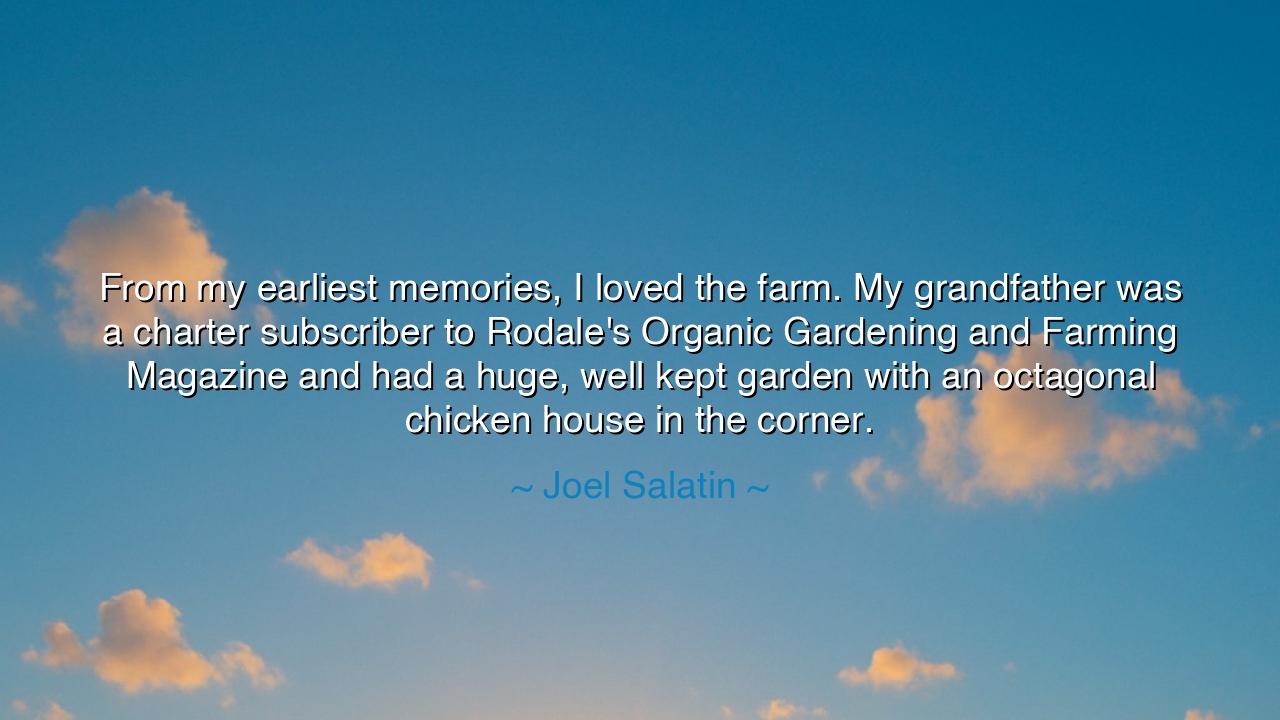
From my earliest memories, I loved the farm. My grandfather was a
From my earliest memories, I loved the farm. My grandfather was a charter subscriber to Rodale's Organic Gardening and Farming Magazine and had a huge, well kept garden with an octagonal chicken house in the corner.






“From my earliest memories, I loved the farm. My grandfather was a charter subscriber to Rodale’s Organic Gardening and Farming Magazine and had a huge, well-kept garden with an octagonal chicken house in the corner.” Thus spoke Joel Salatin, the philosopher-farmer of Virginia’s Polyface Farm, whose life has become a hymn to the harmony between man and the earth. In these words, he recalls not merely the nostalgia of childhood, but the sacred beginning of a calling—the awakening of the human soul to the rhythm of soil, seed, and sunlight. This is no simple recollection of youth, but a declaration of heritage, love, and continuity—the kind of memory that shapes destiny.
The origin of this quote lies in Salatin’s deep-rooted upbringing in an era when farming was beginning to lose its intimacy. His grandfather, a man of foresight and devotion, stood among the pioneers who embraced organic farming, subscribing to Rodale’s Organic Gardening and Farming Magazine, a cornerstone of the postwar movement that sought to restore respect for the living soil. From this foundation, young Joel inherited more than a trade—he inherited a worldview. His love for the farm was not born of profit or necessity, but of wonder. He grew up in the presence of orderly gardens, living creatures, and the quiet wisdom of hands that worked with nature, not against it.
To say, “I loved the farm,” is to speak of more than affection—it is to proclaim belonging. For the farm, in Salatin’s memory, was a living teacher. The garden, “huge and well kept,” was not just a source of food but a symbol of discipline, care, and beauty born of labor. The octagonal chicken house, with its curious geometry, stood as a testament to thoughtful design, to harmony between human craft and the needs of life. Every structure, every seedbed, every animal enclosure carried meaning. Through these early encounters, Salatin came to understand a principle older than civilization itself: that man is not the master of the earth, but its steward.
The ancients would have recognized this wisdom. In the times of the Greeks, the philosopher Theophrastus, a disciple of Aristotle, wrote of the moral virtue of tending the land, of finding joy in the cycles of growth and decay. Likewise, the Roman poet Virgil, in his Georgics, sang of the farmer’s toil as the purest expression of human virtue. “Happy the man,” he wrote, “who knows the rural gods.” Joel Salatin, in our modern age, stands in that same lineage—one who sees farming not as drudgery, but as a sacred vocation, a communion with the divine order woven into the living world.
In remembering his grandfather, Salatin also speaks of inheritance—not of wealth, but of wisdom. For every generation must receive something greater than machinery or money; it must receive values, principles, and a sense of connection to creation. His grandfather’s devotion to organic farming was not simply about soil chemistry or crop yield—it was about respecting life’s balance, understanding that health in the soil becomes health in the plant, in the animal, and ultimately in man. It was this chain of care, this sacred ecology of life, that Salatin absorbed from his earliest years, shaping him into one of the foremost advocates of sustainable agriculture in our time.
The story of Salatin’s childhood is also a lesson about roots—how they anchor us, nourish us, and shape our identity. In an age of transience and abstraction, he reminds us that love for the earth is not an idea but a lived experience, cultivated through touch, smell, and sweat. Just as his grandfather tended his garden, so too did Joel tend his calling, transforming a small family farm into a model of ecological balance. His work, like the garden of his youth, is an act of faith in regeneration—that if man listens to nature with reverence, the land will sing back with abundance.
Therefore, my child, take this teaching to heart: whatever field you labor in—be it soil or craft, mind or art—let your work be an act of love. Let it grow from your roots, not your restlessness. Learn from the earth’s patience, from the gardener’s care, from the farmer’s humility before the seasons. Build something that endures beyond you, as Salatin’s grandfather did—a legacy of stewardship and gratitude.
For in the end, the farm of Joel Salatin’s memory is not merely a place; it is a mirror of the human soul. It reminds us that the love of the earth, once planted in the heart, can shape a life of purpose and harmony. The soil remembers every hand that tends it, and the heart remembers every lesson the soil teaches. So let your life, too, be a well-kept garden, and may your days bear fruit worthy of the generations to come.






AAdministratorAdministrator
Welcome, honored guests. Please leave a comment, we will respond soon